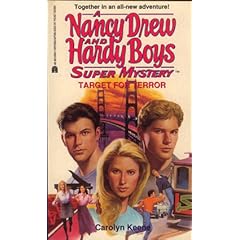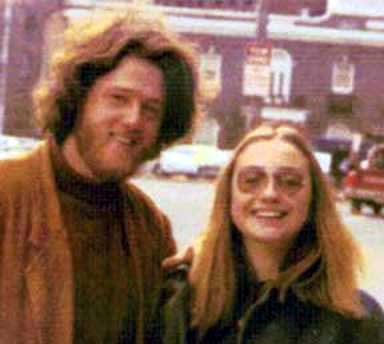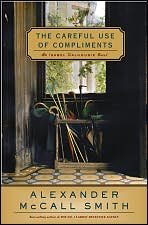Check out this correction in the Washington Post:
A Dec. 16 Book World review included an incorrect name for a character in Jane Austen's "Pride and Prejudice." His name is Fitzwilliam Darcy.
A Dec. 16 Book World review included an incorrect name for a character in Jane Austen's "Pride and Prejudice." His name is Fitzwilliam Darcy.



"I think there's no doubt that we represent the kind of change that Sen. Clinton can't deliver on, and part of it is generational," Obama, 46, said on Fox News. "Sen. Clinton and others, they've been fighting some of the same fights since the '60s, and it makes it very difficult for them to bring the country together to get things done."




New York Times Book Review... has rarely met a feminist it liked. The former ballerina Toni Bentley, author of a book on the delights of crotchless panties and the epiphanies of anal sex (I quote: a “direct path … to God”), was assigned to review Pollitt’s latest collection of essays, Learning to Drive and Other Life Stories, and apparently didn’t like it. Fair enough. But Bentley, possibly disappointed by the lack of sodomy, used her review as an opportunity to trash feminists and to trash Pollitt for both being one and not being one who is stereotypical enough.I am so sick of the way the Times deals with gender and race. Why, Jill Abramson why?
She has a weakness for dubious ethnic analogies: “His eyes were wild, like those of the pumas that lived in the jungles,” and “A nurse wrapped Beatriz in a blanket—like a burrito.”
Enjoy this latest piece of idiocy/brilliance from the lonely island heartthrob trio... who, incidentally, need to QUIT that sinking unfunny corporate ship at SNL PRONTO and go totally viral.
 An Isabel Dalhousie novel by Alexander McCall Smith.
An Isabel Dalhousie novel by Alexander McCall Smith.
Too Much Information is a concept rarely honored in modern presidential politics. In a YouTube, cellphone photo, I’m-posting-it-on-the-Web world, no secret is safe, no taboo assumed, no limit observed.Powell seems to have forgotten that his own newspaper (not to mention cable TV pundits) profiles the fashion decisions, family lives and the personal histories of candidates on a regular basis, playing to an audience that's far more established and influential than the YouTube/internet generation.
How American politics came to this pass has two answers. The short version starts with Jimmy Carter, who told Playboy magazine that that he had lusted in his heart after women. And it ends with Bill Clinton and the Starr report. President George W. Bush got the message; asked about his own past peccadilloes, he more or less said those were in the past.Powell, while essentially praising Bush for stonewalling the press, de-emphasizes the fact that Bush was free to dismiss questions posed to him, while Clinton's hand was forced by the special prosecutor's office. By this logic any candidate who refuses to divulge personal information should be praised. But he reverses this assumption when discussing democratic candidate John Edwards.
The reporter begins by saying: “I hope this isn’t too personal.” That’s when Mr. Edwards’s inner siren should have started screaming. How, the writer asks, did you break her rib with a hug?
“Maybe it is a little personal,” Mr. Edwards says.
Here, Powell castiages John Edwards for not knowing what a reporter was going to ask beforehand, and then politely refusing to answer the question without making a big fuss over it. But in his fawning closing anecdote about Rudy Giuliani, Powell praises him for doing what amounts to the same thing as Edwards, but more rudely.
The twisted logic of this story, and its refusal to acknowledge how the Times staff and columnists like Maureen Dowd have contributed to the phenomenon of over-scrutinizing the candidates underscores how disingenuous the mainstream media can be when it comes to its own role in shaping political discourse. I mean, peoples, this is like the tenth Sunday styles article aboutA young mother stood up and asked Mr. Giuliani about his three marriages and his frosty-to-nonexistent relationship with his two children. He fixed her with that stare.
“I love my family very very much and will do anything for them,” he said. “The best thing I can say is, kind of, ‘Leave my family alone, just like I’ll leave your family alone.’ ”
Don’t go there — what a candidate concept.


“a lot of people come up here and thank Jesus for this award. I want you to know that no one had less to do with this award than Jesus. So, all I can say is, ‘suck it, Jesus.’ This award is my god now.”

She lazily walked through her dance moves with little enthusiasm. It appeared she had forgotten the entire art of lip-synching; and, perhaps most unforgivable given her once taut frame, she looked embarrassingly out of shapeI repeat, this was an AP article.



Okay, so Ms. Spears may not fall into the purview of normal EBC topics, but confound it, man. She's back! And my peeps and I are blasting this single, "Gimme More" all throughout this long weekend. Enjoy it!

In a word, she was always flinging Rebecca into Ivanhoe's teeth. There was not a day in his life but that unhappy warrior was made to remember that a Hebrew damsel had been in love with him, and that a Christian lady of fashion could never forgive the insult. For instance, if Gurth, the swineherd, who was now promoted to be a gamekeeper and verderer, brought the account of a famous wild-boar in the wood, and proposed a hunt, Rowena would say, "Do, Sir Wilfrid, persecute these poor pigs: you know your friends the Jews can't abide them! "
Becoming Vladimir: Pedophilia was his greatest inspiration.
Becoming Toni: Infanticidal escaped slaves were her greatest inspiration.
Becoming Fyodor: Brutal murder, self-doubt, subsequent exile and eventual redemption were his greatest inspiration.
Becoming Herman: Pigment-deficient whales were his greatest inspiration.


I don't know, how about igniting a "shut the hell up and report the news" moment? Does the Times ever stop to consider how sexist and ridiculous all this scrutinizing of the potential first ladies' comments vis-a-vis each other are? I mean, it's one thing to report on something like this with a healthy dose of skepticism. It's another to lap it up like a cat laps up milk. Later, the author says:"If you can’t run your own house, you can’t run the White House.” The words are from Michelle Obama, wife of Barack. Will they ignite this campaign’s version of a “baking cookies” or “never had a real job” moment?
Here’s a choice: You can take a look at the transcript Sargent provides at the above link and decide for yourself, or you can let bloggers decide for you.The Times decides to do the latter, of course. But look through the comments. They are truly angry--not at Michelle, but at the way the Times has chosen to report this. A sampling:
1-That the NYT only covers this stupid non-controversy reaffirms my decision to obtain news and information from outside the traditional media that seemingly cannot sit still through a five minute speech.
2-Why is the media wasting our time trying to drum up a “cat” fight between Mrs. Obama and Ms. Clinton? These are the ridiculous exploits that derail critical, serious focus on important issues, such as war, taxes, global warming, poverty and a dozen other real and pressing world problems. Give us a break….!
3-All of these comments are spot-on. Please give us substance and leave the fluff for the lesser media outlets.
4-Why is this blog, under the auspices of “the paper of record,” further propagating this ridiculous story? Read the transcript–she was clearly talking about her own family. It’s so annoying that the media turns to Drudge to pick up stories that don’t mean anything. Is this what I get for spending my money on Times Select? Garbage.
5-Tempest in a teapot indeed….please, please, please, my beloved NY Times, give us substantive reporting on the issues and the philosophical and moral choices we have,
6-If we’re going to assume that Michelle Obama “meant” some kind of dig when she made the comment, “If you can’t run your own house, you can’t run the White House,” why isn’t it just as easy to imagine that it was a dig at all the Republican candidates who are into their 2nd, 3rd, etc., marriage? Why is everyone assuming that, if it was anything at all, it was a dig at Hillary??? We need to start focusing on the issues, people, and stop analyzing the minutia for potentially scandalous tidbits.


In the former case, with nothing of major import on the line, two big newspapers had no trouble breaking agreements and getting their hands on an unreleased novel--it was all in pursuit of The News, after all! Yet when it came to a topic that mattered to millions of Americans--and affected them in the pocketbook region--similar newspapers steadfastly hewed to the gentlemen's agreement they made, taking no pains to subject the tax plan to even the slightest scrutiny.Sigh. It's going to take a long long long ass-time to wash away the sins of our "objective" press.

A Uk survey lists readers' favoritest love stories:
"It's really heartening to see how these stories, written so long ago, retain the power to captivate 21st century audiences," said Richard Kingsbury, channel head of UKTV Drama, which commissioned the study. (aha! a TV station commissioned it eh?)
My main girls Jane and the Brontes are definitely representing. I might add some post-1900 romances like The Age of Innocence or Tender is the Night but since those all end so miserably... I see why they didn't get votes. But then again Wuthering Heights' "and then the two ghosts wandered around the depressing moors forever" ending isn't exactly heartwarming. Nor is R and J. So go figure.
The top 20
1 Wuthering Heights Emily Brontë, 1847
2 Pride and Prejudice Jane Austen, 1813
3 Romeo and Juliet William Shakespeare, 1597
4 Jane Eyre Charlotte Brontë, 1847
5 Gone with the Wind Margaret Mitchell, 1936
6 The English Patient Michael Ondaatje, 1992
7 Rebecca Daphne du Maurier, 1938
8 Doctor Zhivago Boris Pasternak, 1957
9 Lady Chatterley's Lover DH Lawrence, 1928
10 Far from The Madding Crowd Thomas Hardy, 1874
11 = My Fair Lady Alan Jay Lerner, 1956
The African Queen CS Forester, 1935
13 The Great Gatsby F Scott Fitzgerald, 1925
14 Sense and Sensibility Jane Austen, 1811
15 = The Way We Were Arthur Laurents, 1972
War and Peace Leo Tolstoy, 1865
17 Frenchman's Creek Daphne du Maurier, 1942
18 Persuasion Jane Austen, 1818
19 Take a Girl Like You Kingsley Amis, 1960
20 Daniel Deronda George Eliot, 1876

 Fellow-ette. ~Sarah Marian S., freelance writer and adorer of all things leftist and literary. ~About this blog~
Follow this blog.
Subscribe to posts
Subscribe to comments
Follow me on Twitter
Subscribe by Email.
Fellow-ette. ~Sarah Marian S., freelance writer and adorer of all things leftist and literary. ~About this blog~
Follow this blog.
Subscribe to posts
Subscribe to comments
Follow me on Twitter
Subscribe by Email.
(also known as recent comments)
"Provided that nothing like useful knowledge could be gained from them, provided they were all story and no reflection, she had never any objection to books at all."-- Austen on Northanger Abbey's Catherine Morland